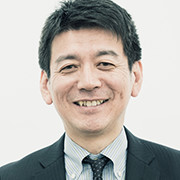(August 9, 2017)
chapter 2
Kazuo Yano Corporate Chief Scientist, Research & Development Group, Hitachi, Ltd.
Yano: I often hear that American companies are leading the field of AI. However I think this is not a very balanced view as they are only talking about very specific areas of AI. By that I mean, often it is just part of an algorithm for a specific search function or AI designed for a very specific purpose. I say this, because for AI to work, it requires data but that data must be related to actual operations, business or activities in society. What’s happening now, and has been for about the past 15 years, is that business has gone on the Internet or begun providing various services through websites, starting from areas of easy entry such as e-commerce and search function. IT in these areas has progressed quite significantly.
On the other hand, what’s happening in AI now is not just about AI for the Internet, or Internet-related areas. The main conversation now is how to best leverage data and AI in areas that historically appear distant, such as in banks, railways, construction sites and hospitals; in other words, connect with the various issues in the real world at the actual site or in management. When that happens, it will be necessary to re-define the boundaries of what these companies or industries have considered their main area of operation.
Hitachi and the Hitachi Group have a strong background in AI and data, as well as a large IT business of approximately 2 trillion Japanese yen. Not only that, but we also do business in areas such as energy, healthcare, railway, elevator, the industrial and manufacturing sectors which adds up to business of about 10 trillion yen; that is, we are involved in a wide range of businesses and various aspects of society, working with customer and partners on a daily basis. This makes Hitachi a very unique company in the world. IT, or AI and data, are applicable to all these areas. No matter how hard one works to create a program inside of a computer, without this connection to real world, benefit is limited. I am certain that there is no company that can better cover such a wide section of society than Hitachi.
If you look at company overviews of their AI, you will notice immediately Hitachi is way ahead in the number of real use-cases introduced. This is what Hitachi is about. We are fortunate to be able to work with various customers, accessing various types of data daily. This is the reason why Hitachi is able to lead progress in the creation of practical and concrete applications for AI and data. I believe that the advantage Hitachi has is being able to lead the field with AI technology in the real sense of truly useful algorithm, not just an algorithm conceived in the mind or described at an academic conference.

Kazuo Yano, Dr. Eng.
Corporate Chief Scientist, Research & Development Group, Hitachi, Ltd.
Joined Hitachi, Ltd. in 1984. In 1993, he achieved the world's first successful operation of single-electron memory at room temperature. Since 2004, he has taken the lead in wearable technology, as well as the collection and utilization of big data. His papers have been cited 2500 times, and he has 350 patent applications. The wearable sensor he developed, known as the "Business Microscope," has been described by the Harvard Business Review as a "historic wearable device." He is known for his specialist breadth and depth from AI to nanotechnology. His literary work, "Invisible Hand of Data: The Rule for People, Organizations, and Society Uncovered by Wearable Sensors" (Soshisha Publishing), was elected one of BookVinegar's 2014 10 Best Business Books. Dr. Yano has a doctorate in engineering, he is an IEEE Fellow, a visiting professor at the Tokyo Institute of Technology, and a member of the Ministry of Education, Culture, Sports, Science and Technology's Information Science and Technology Committee. He has been awarded many international awards, including the 2007 MBE Erice Prize, and Best Paper at the 2012 International Conference on Social Informatics.
(As at the time of publication)